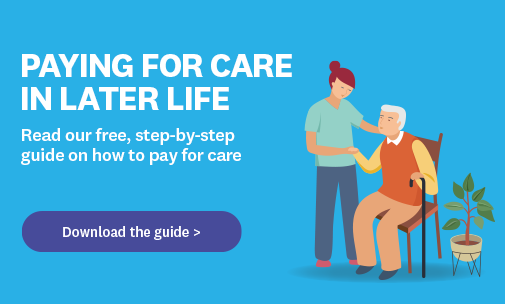By clicking a retailer link you consent to third-party cookies that track your onward journey. This enables W? to receive an affiliate commission if you make a purchase, which supports our mission to be the UK's consumer champion.
Can you reduce your risk of dementia?

Out of all the health conditions we associate with getting older, dementia is perhaps the most feared.
But dementia is not an inevitable consequence of ageing. And while we don't yet fully understand what causes it, research suggests that there are things you can do in mid-life to reduce your chances of developing the condition in later life.
It's why Public Health England (PHE) has recently released guidance to promote healthy lifestyles that can reduce the risk of dementia.
What is dementia - and who gets it?
Technically, dementia isn't one disease. It's a group of symptoms that affect the brain (including memory loss and difficulties with thinking, problem-solving or language) which deteriorate over time. Around 850,000 people in the UK live with dementia. It's not a natural part of ageing - and it isn't usually hereditary.
There are different forms of dementia (which all have slightly different symptoms). The most common type is Alzheimer's disease.
- Learn more about the other types of dementia, such as vascular dementia and frontotemporal dementia
Unfortunately, there is no cure for dementia yet, which means people with the condition are likely to access help through the social care system rather than the NHS. Around 70% of residents in care homes have dementia or severe memory problems.
The Alzheimer's Society estimates the annual cost of dementia to society in the UK to be £26.3 billion - higher than cancer, heart disease or stroke.
Read our guide to helping someone with dementia live well.
Can you prevent dementia?
There's no certain way to prevent dementia. However, researchers believe that a healthy lifestyle can reduce the risk. It's now thought that 40% of dementia cases could be traced back to factors that can be changed (called 'modifiable risk factors')*.
The biggest risk factor for developing dementia is age - and there's not much you can do about that. But certain things have been shown to increase the chances of someone developing the illness such as:
- smoking
- lack of exercise
- alcohol
- weight and diet
- lack of social contact.

Smoking
Smoking is one of the most important modifiable risk factors for dementia. Cigarettes are thought to increase the risk by narrowing the blood vessels in the heart and brain. They also increase the risk of other diseases, such as heart disease, type 2 diabetes and stroke, that can make certain forms of dementia (such as vascular dementia) more likely.
Giving up smoking can be really tough, but your local council should have support available to make the process less daunting. They might offer one-to-one counselling or nicotine replacement therapies.
You can find local stop-smoking services through the NHS website.
Exercise
We all know living a sedentary lifestyle isn't good for the body, but it could also be bad for the brain. The Alzheimer's Society says taking regular exercise appears to be one of the best things you can do to reduce your risk of getting dementia. Several studies show people who exercise regularly score better in memory and thinking tests than people who do not.
The NHS recommends everyone does at least 150 minutes of moderately intense exercise each week, such as brisk walking, cycling or dancing - alongside strengthening exercises twice a week such as gardening or yoga.
If you have mobility difficulties, meeting these targets could be tricky, but even a small amount of exercise can be beneficial. There are plenty of gentle home exercises suitable for older people - our guide takes you through some of the best ones.
Alcohol
Alcohol is safe in moderation but drinking excessive amounts of it increases the risk of stroke, heart diseases and some cancers. It can also cause damage to your brain, which could up the chances of dementia.
The NHS recommends drinking no more than 14 units of alcohol a week. And if you regularly drink this much, it's best to spread your drinking over three or more days and have several alcohol-free days each week.
Weight and diet
Being overweight or obese increases the risk of conditions that affect your heart, which can also increase the risk of dementia. So it's best, if possible, to maintain a healthy weight - or try to lose weight if you need to. The NHS says that losing 5% to 10% of excess weight can help to reduce your risk of dementia.
Cutting out foods that are high in saturated fat, salt and sugar is also a good idea. These types of meals can increase your risk of high blood pressure, high cholesterol and type 2 diabetes, which have all been linked to dementia.
Can health supplements help to prevent dementia? We explore the evidence for products that claim to boost your brain health
Loneliness
It's not all about diet and exercise. Lack of social contact can have a profound effect on health, and research shows it might increase your risk of dementia too.
Tackling feelings of loneliness and isolation isn't easy though, particularly at a time when Covid-19 restrictions might have shrunk your social network. Our guide to dealing with loneliness has several suggestions for addressing these unpleasant feelings and steps you can take to get to know new people.
Keeping your brain active
Keeping the brain active and stimulated in later life is just as important as staying physically active. Hobbies that stimulate your brain, such as reading, puzzles or learning a new language, might also reduce your dementia risk, research suggests.
Keep your brain sharp with these cognitive exercise suggestions.
How to get an NHS health check
Making (and maintaining) a lifestyle change is no mean feat, but there may be support available to help you get healthier. In the new guidance, PHE highlights that one good way of assessing your dementia risk is getting a health MOT. The NHS offers a 'Health Check' every five years to anyone between 40 and 74 who doesn't have a serious pre-existing health condition.
You should get a letter from your GP or local council inviting you to the free health check. But you could also call your surgery to get one booked in.
Visiting your GP might seem like a hassle, but don't be tempted to substitute it with a DIY health test. Our research has uncovered some worrying drawbacks about these trendy kits:The problem with DIY health test kits.
* Dementia prevention, intervention, and care: 2020 report of the LancetCommission


